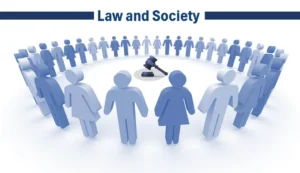Home » How Do Legal Systems at the Nexus of Law and Society?

Since society is a “web-relationship,” any change in it must inevitably involve a reorganization of the social relationships that make up society. A social relationship is understood in terms of social procedures, social cooperation, and social linkages. Thus, the phrase “social change” is used to illustrate appealing variations in social organization, social procedures, and social base. It integrates modifications to the framework and public components. Society and law are interdependent systems that shape and impact one another.
Legal systems are a byproduct of the cultures in which they are found, not something that is established in a vacuum. A more thorough investigation is necessary due to the significant ramifications of this complex relationship between society and the law. We will examine how legal frameworks adjust to societal changes, examine the workings of judicial systems, comprehend the complexities of Indian law and administration, and investigate the effects of societal norms on legal systems as we examine the relationship between law and society in this article.
The ever-changing dynamics of society mandate the need for legal frameworks that can both adapt and accommodate these changes. Legal frameworks must be adaptable enough to take into account new issues as they arise, as well as developments in technology and societal norms.
Legal framework adaptation requires striking a careful balance between enacting the required changes and upholding the core values of justice. One example of legal adaptation is the growing recognition of the rights of marginalized groups, such as the LGBTQ+ community. Recent changes in societal perceptions of gender and sexual orientation have prompted a review of the laws governing marriage, adoption, and discrimination. Legal systems today strive to give everyone the same rights and safeguards, regardless of their gender identity or sexual orientation.
In addition, the development of technology has given judicial systems additional difficulties. Legal frameworks for issues like cyber security, data privacy, and intellectual property rights need to keep up with technological changes. This calls for the drafting of new laws and rules to handle these new issues.

The administration of justice and preservation of the rule of law are fundamental functions of the judicial system. It performs the dual functions of interpreting and applying the law and providing a channel for conflict resolution. Knowing how the legal system operates is essential to understanding how society and the law interact.
The courts, judges, attorneys, and the procedures used to settle disputes are the main elements of a judicial system. Every element is essential to guaranteeing the efficient and just administration of justice.One aspect of the judicial system that warrants examination is the concept of judicial independence. Judicial independence ensures that judges are free from external influence and can make decisions based solely on the law and facts of the case. This independence is crucial for upholding the integrity of the legal system and ensuring public trust.
Moreover, access to justice is another critical aspect of the judicial system. It ensures that individuals, regardless of their socio-economic background, can effectively participate in legal proceedings and seek redress for their grievances. Lack of access to justice can perpetuate inequality and undermine the functioning of the legal system.
Health Laws in India: A Legal & Judicial Analysis
In India, Understanding how law and society intertwine is made easier with the help of India, a country with a rich history and diverse population. The laws of the colonial era, historical legal customs, and contemporary constitutional ideas are all sources of inspiration for the Indian legal system.
The highest law of the land in India is the 1950 Constitution. It establishes essential rights and the ideas of equality, justice, and liberty within a democratic and secular framework. Under the federal framework of the Indian legal system, the federal government and the different states have distinct legal jurisdictions.
The administration and laws of India have changed over time to meet the requirements and goals of the country. To end social evils, advance inclusion, and preserve constitutional ideals, legal reforms have been implemented. Indian laws are constantly changing, as evidenced by the anti-dowry laws, reserve policy for oppressed tribes, and the recent legalizing of homosexuality.
Nonetheless, there are still issues with the Indian judicial system. Ensuring effective access to justice for all is hampered by the backlog of cases, the delays in the administration of justice, and accessibility problems. The goals of legal assistance programs, judicial administration reforms, and alternative conflict resolution procedures are to close these gaps and improve the efficiency of the legal system.
Moreover, social norms have an impact on how laws are enforced. When enforcing laws that go against widely held social views, law enforcement and judicial authorities may encounter difficulties. The divide between societal acceptance and legal requirements can be filled in part by community involvement, awareness campaigns, and sensitization initiatives.
Legal systems need to maintain a careful balance between upholding social norms and guaranteeing equality and justice for all. This calls for constant communication and interaction with a range of stakeholders, such as marginalized populations, human rights advocates, and civil society organizations.
In summary, the relationship between society and the law is a complicated and multidimensional process. Legal systems need to change to meet new challenges and the changing requirements of society. Knowing how judicial systems operate, including judicial independence and access to justice, is crucial in comprehending the role of law in society. Indian laws and administration provide a unique case study in examining the intersection of law and society, highlighting the challenges and reforms within the system. Lastly, societal norms and values have a profound impact on legal systems, necessitating ongoing dialogue and engagement to ensure justice and equality for all.
Future of Indian Legal Profession
Lingayas Vidyapeeth is recognized as the Best University for Law in Faridabad, Delhi NCR, offering LLB and LLM Programs that provide authorized degrees with excellent prospects for future career success. Its comprehensive curriculum and esteemed faculty ensure students receive a quality legal education, preparing them for rewarding opportunities in their professional lives.
Vivek Gupta
Assistant Professor
Law Colleges In Faridabad Haryana
Lingaya’s Vidyapeeth
February 10, 2024RECENT POSTS
CATEGORIES
TAGS
Agriculture Agriculture future AI Architecture artificial intelligence BA English BA Psychology BTech Engineering Business management career Career-Specific Education career guide Career Opportunities career option career scope Civil engineering commerce and management Computer Science Computer science engineering Data science degree education Engineering engineering college Engineering students English Literature english program Exam tips Fashion Design Fashion design course Higher Education Journalism journalism and mass communication law Law career Machine Learning MA Psychology Master degree mathematics MBA Mechanical Engineering Pharmacy Psychology Research and Development students
University Address: Nachauli, Jasana Road, Faridabad, Haryana
Toll Free: 1800-120-4613
Mobile : 8447744303 | 8447744304 | 8447744306 | 8447744309
[email protected]
[email protected]
[email protected]
[email protected]
Address: C-72, Second Floor, Shivalik, Near Malviya Nagar,
Above HDFC Bank, New Delhi 110017
Ph.No. - 011-46570515 / 45138169 / 41755703 / +91-7303152412
Jagmani Kutir, Ground Floor, Road No-1, Rajeev Nagar,
Near Darbar Marriage Hall, Patna-800024, Bihar
Contact No: 9818352069/8130120095
Mail: [email protected]
Copyrights © 1998 - 2025 Lingaya's Vidyapeeth (Deemed To Be University). All rights reserved.
It is important to note that the following email IDs and domains are fraudulent and do not belong to our university.
LV only conducts physical/online verification of any document related to examination on the following email id: